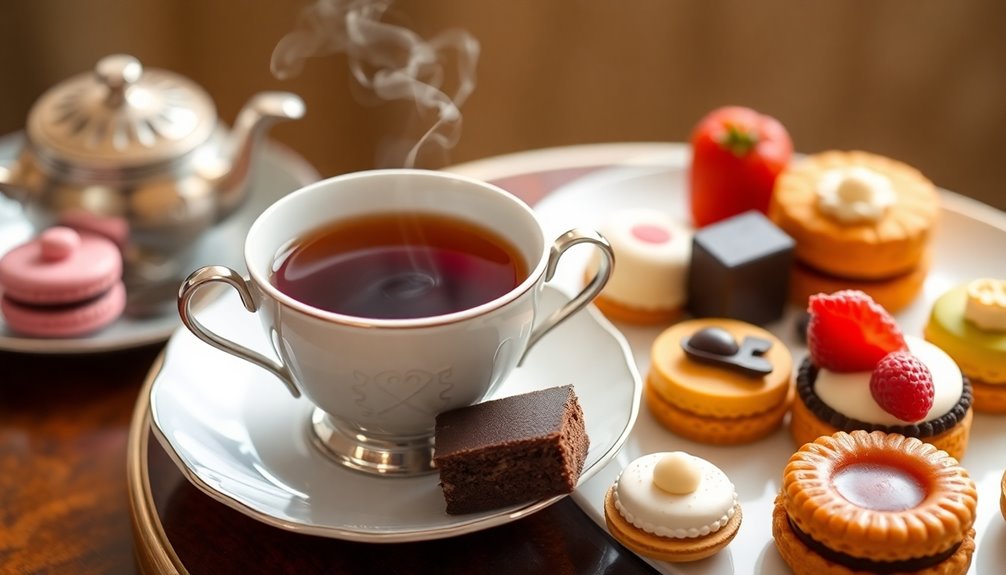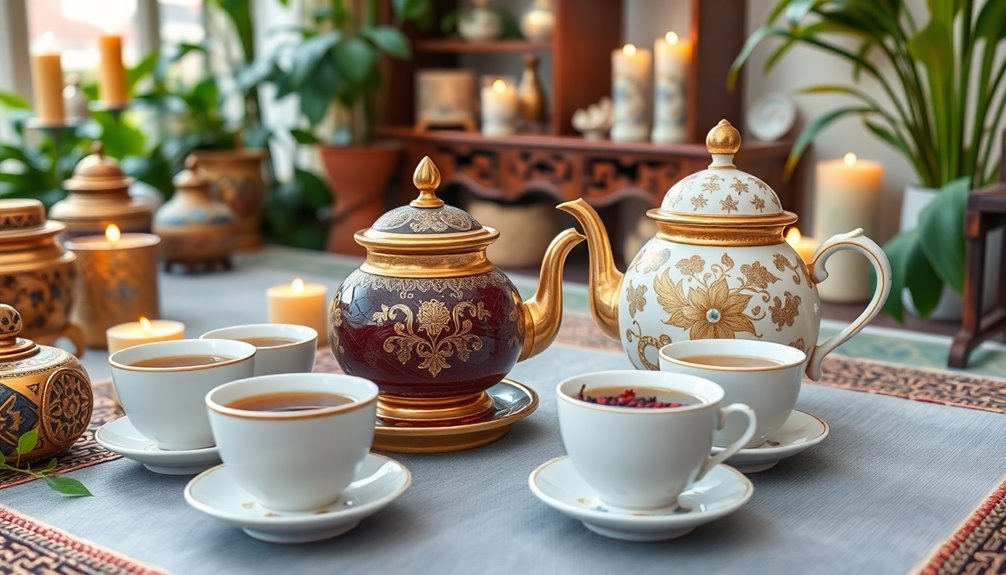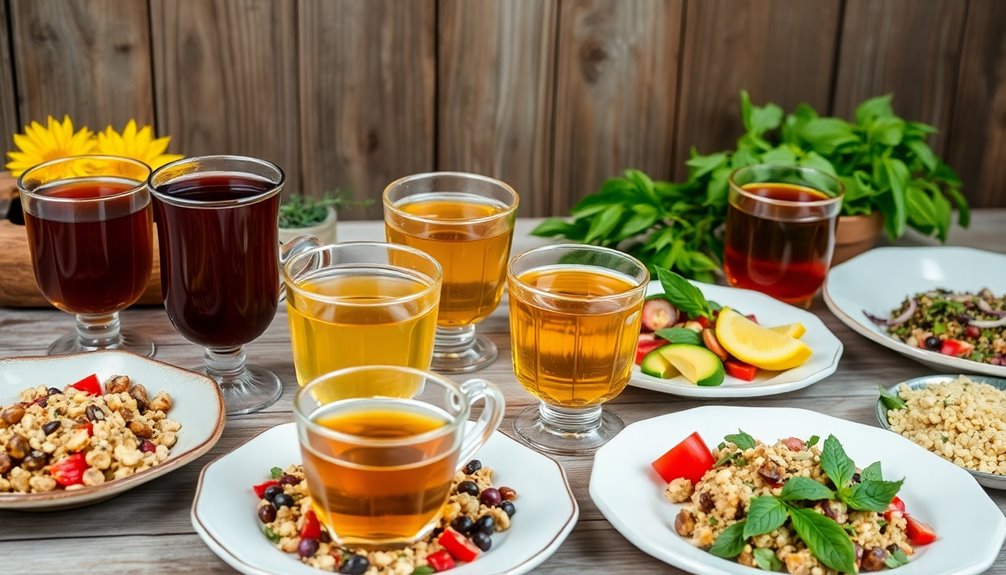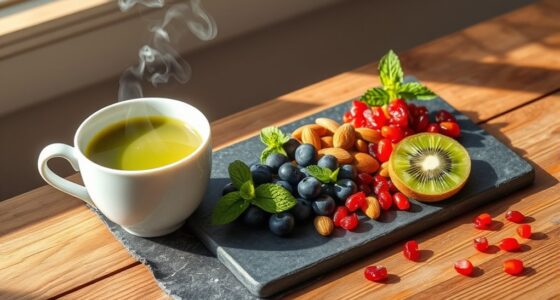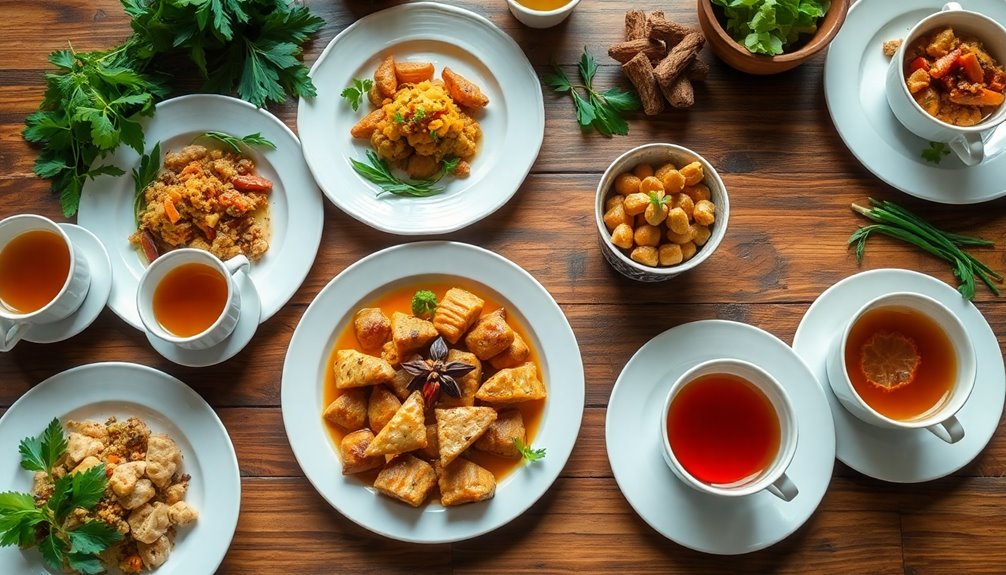Black tea's the ultimate companion for desserts because it enhances flavors and balances sweetness. Its bold, astringent notes work well with rich treats like chocolate cakes and buttery pastries. The tannins in black tea cut through the richness, cleansing your palate and elevating your dessert experience. Varieties like Assam and Darjeeling pair beautifully with everything from nutty cookies to fruity tarts. Plus, the antioxidants in black tea can boost the health benefits of your indulgences. So, if you're curious about how to maximize your dessert pairings, there's plenty more to explore.
Key Takeaways
- Black tea's tannins balance the sweetness of rich desserts, enhancing the overall flavor experience and cleansing the palate between bites.
- Varieties like Assam and Darjeeling offer unique notes that complement a range of desserts, from chocolate cakes to fruity tarts.
- High antioxidant levels in black tea and desserts promote health benefits, potentially reducing inflammation and supporting gut health.
- Black tea's bold, astringent flavor adds depth to dessert recipes, encouraging innovative pairings and infusions in baking.
- Cultural significance of black tea fosters social connections during dessert gatherings, making it a cherished companion in many culinary traditions.
Introduction
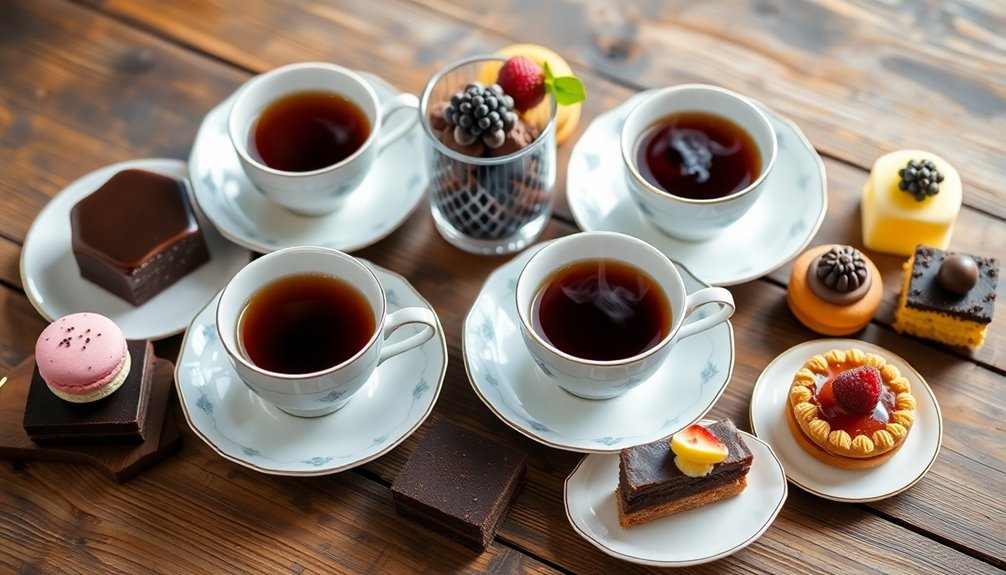
When it comes to indulgence, black tea stands out as a perfect pairing for desserts. Its robust flavor profile enhances the experience of enjoying sweets, making it an ideal companion for rich confections like chocolate cakes and creamy pastries. The tannins in black tea work wonders, offsetting the sweetness and richness of buttery or cream-laden desserts. This balance elevates your tasting experience, allowing you to savor every bite.
Varieties such as Assam and Darjeeling bring distinct flavor notes to the table, complementing an array of dessert types, from fruity tarts to nutty cookies. The versatility of black tea means you can enjoy it with a wide range of desserts that feature berries, nuts, and chocolate, creating layered taste experiences that delight the palate. Additionally, many desserts contain ingredients that are rich in antioxidants which combat aging, enhancing your overall dessert experience by contributing to your well-being. The rich flavors of black tea can also provide anti-inflammatory benefits, which can further enhance your enjoyment of sweet treats. Furthermore, pairing desserts with yerba mate, another antioxidant-rich beverage, can also elevate your culinary experiences. Moreover, the high fiber content of certain desserts can promote better digestion, making each indulgence a more enjoyable experience.
The earthy notes of black tea, combined with the sweetness of your favorite desserts, create a harmonious balance that takes both tea and treats to new heights. Additionally, black tea also contains antioxidants that combat oxidative stress, which can enhance your overall dessert experience by contributing to your well-being.
Black Tea's Rich Flavor Profile
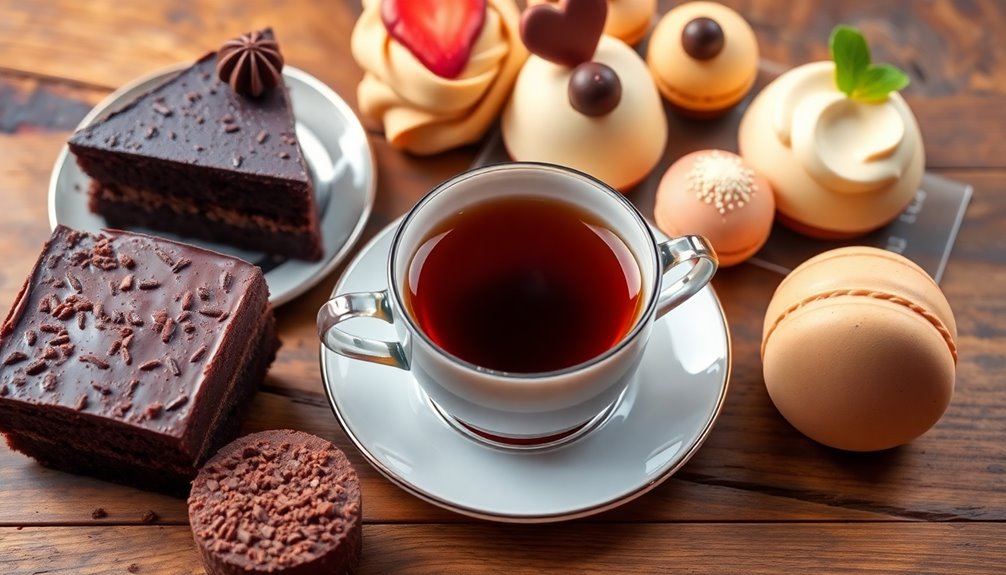
With its bold and astringent notes, black tea delivers a rich flavor profile that perfectly complements a variety of desserts. The robust characteristics of black teas, like Assam and Darjeeling, enhance your dessert experience. Assam offers a malty sweetness that pairs beautifully with rich chocolate cakes, while Darjeeling's floral and fruity notes can elevate lighter pastries. In fact, the right cage setup is essential for hamsters, ensuring they have ample space and enrichment, similar to how the right tea enhances your dessert experience. Brewing techniques, such as French Press Operation, can also play a role in how tea is prepared, impacting the overall flavor. Additionally, selecting the right tea can significantly improve indoor air quality, as a clean environment enhances your overall dining experience.
The tannins in black tea effectively cut through the sweetness and creaminess of desserts, providing a balanced flavor experience. This balance is crucial when you indulge in sugary treats, as the slight bitterness of black tea offsets their sweetness, creating a layered tasting experience. For instance, when you enjoy dark chocolate with a cup of Keemun, the earthy and slightly bitter notes of the tea work in harmony with the chocolate's richness, bringing out its complex flavors. Additionally, the polyphenols in black tea may support gut microbiota health, enhancing your overall dessert enjoyment. Moreover, the health benefits of black tea are well-documented, including its rich content of antioxidants that can contribute to overall wellness.
Black Tea Enhances Dessert Richness
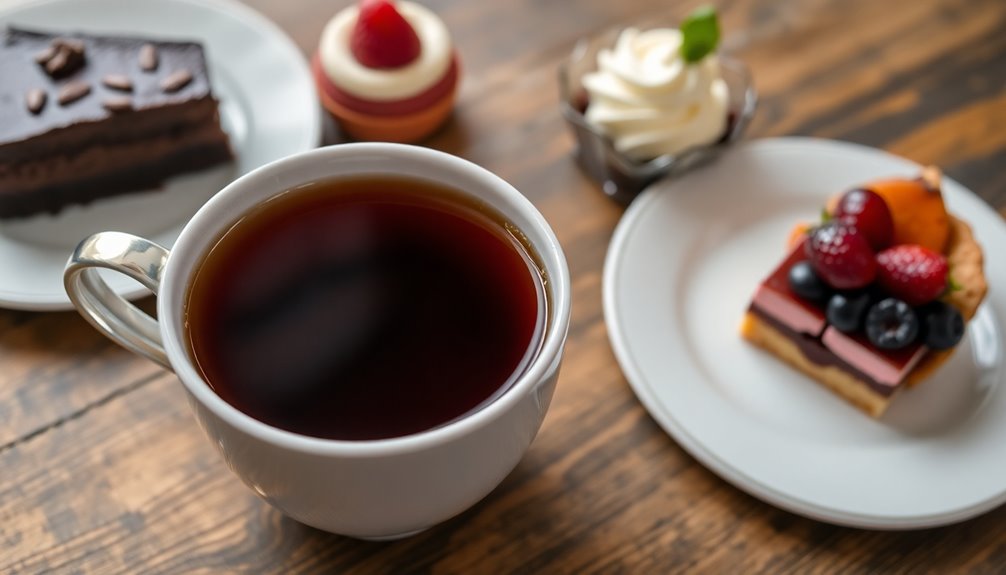
Black tea enhances the richness of desserts by providing a bold counterbalance to their sweetness. Its robust flavor profile, marked by astringency and depth, works wonders when paired with indulgent treats like chocolate cakes and creamy pastries. The tannins in black tea effectively cut through the sweetness and fat content of these desserts, offering a refreshing contrast that elevates the overall tasting experience. Additionally, the preparation of black tea, such as using freshly ground coffee beans for optimal flavor, can mirror the meticulous approach taken with dessert pairings. For a quick breakfast option, consider pairing your tea with Egg Rollup and Dumpling Sauce, which offers a protein-rich start to the day.
When you enjoy black tea alongside rich desserts, you'll notice how the deep, earthy notes amplify the flavors of your treats. For instance, pairing Assam black tea with buttery shortbread can bring out the pastry's nutty undertones, while Darjeeling complements fruity berry tarts beautifully. Each variety of black tea has unique characteristics that can enhance different dessert flavors, making every pairing a delightful adventure. Furthermore, the rising popularity of specialty teas has encouraged innovative pairings that enhance dessert experiences even further. Herbal teas, which lack caffeine, can also serve as a calming alternative to black tea when you desire a soothing beverage after dessert. The art of traditional tea ceremony emphasizes the importance of mindful enjoyment, making the experience of savoring black tea with desserts even more memorable during social gatherings, where the interplay of flavors creates lasting moments for you and your guests.
Cultural Significance of Black Tea
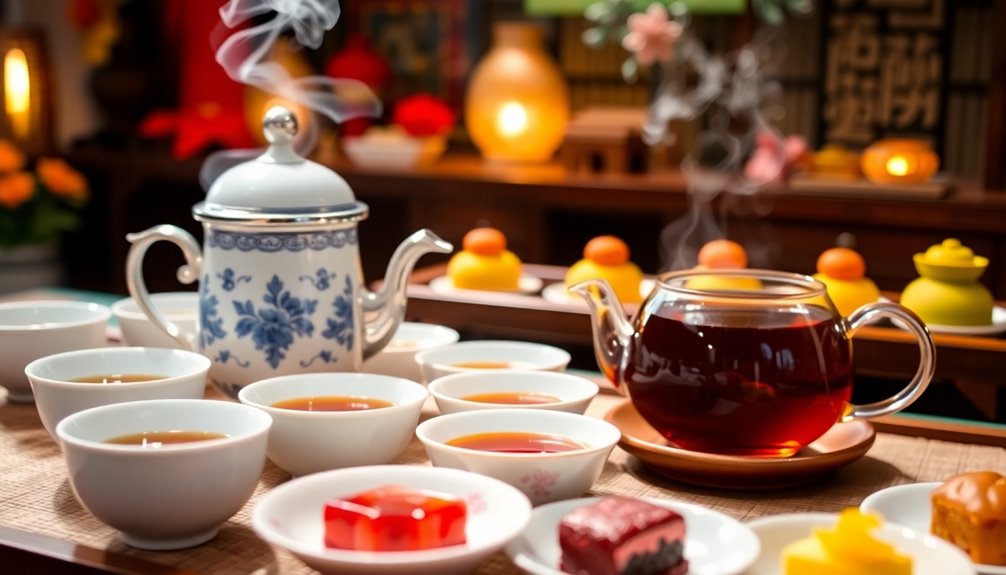
Throughout the world, black tea holds a profound cultural significance, often seen as a symbol of hospitality and community. In countries like England, it's an essential part of the afternoon tea ritual, where friends and family gather to enjoy a variety of desserts and pastries. This tradition not only highlights the importance of black tea but also fosters social connections. Additionally, the practice of sharing tea encourages collaboration and teamwork, reinforcing bonds among participants. The gathering around tea often reflects urban themes that mirror the rapid modernization of societies. Furthermore, many cultures celebrate breakfast through unique dishes, showcasing the diverse meal choices that can accompany tea. As a testament to its cultural importance, celebrity events often feature black tea as a staple in their menus, highlighting its enduring appeal.
In China, black tea, referred to as "red tea," plays a vital role in family gatherings and celebrations. It represents warmth and connection, making it an integral part of their cultural practices. With approximately 75% of the global tea market dominated by black tea, its widespread popularity underscores its relevance across various cultures.
Moreover, many culinary traditions incorporate black tea into dessert recipes, enhancing flavors and adding depth. From black tea-infused cakes to creamy puddings, this versatile beverage elevates desserts, creating unforgettable experiences. Additionally, the infusion of black tea into local specialties can be seen in various regions, showcasing its adaptability in diverse culinary landscapes.
Caffeine Sensitivity in Dessert Pairing
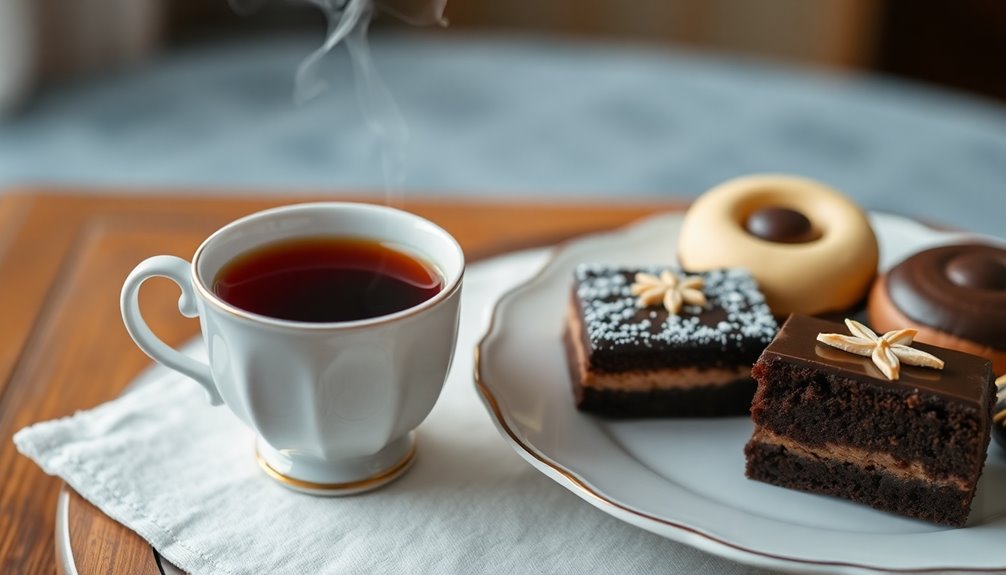
Many people experience varying levels of caffeine sensitivity, which can influence their dessert pairing choices. If you're among the 10-20% who feel adverse effects from caffeine—like anxiety or insomnia—you'll want to be mindful of what you sip alongside your sweets. Additionally, consider that color accuracy plays a crucial role in enhancing the visual appeal of your dessert presentation, making it more enjoyable.
While black tea has a lower caffeine content than coffee, with about 40-70 mg per 8 oz cup, it can still affect those with heightened sensitivity. Additionally, consider pairing your desserts with options that include omega-3 rich ingredients, as they can provide health benefits that complement your sweet treats. Furthermore, it's important to dilute oils significantly before using them in an aromatic setting to ensure a pleasant experience. Consuming antioxidant-rich foods like desserts paired with black tea can further enhance your overall well-being.
When pairing black tea with desserts, moderation is key. The rich flavors of desserts can actually help mitigate the stimulating effects of caffeine, allowing you to enjoy the delightful taste of black tea without feeling overly stimulated. This balance lets you savor the pairing without the jitters. Additionally, being aware of the potential side effects of black tea can enhance your overall enjoyment while ensuring you don't exceed your caffeine limits.
If you're looking to avoid caffeine altogether, consider herbal teas or decaffeinated black tea as alternatives. These options can still enhance your dessert experience while keeping caffeine sensitivity in check.
Practical Applications

Finding the right dessert to pair with your black tea can elevate your culinary experience, especially when you consider the tea's robust flavor profile. Black tea's boldness and astringency work wonders with rich desserts like chocolate cakes and creamy pastries, balancing their sweetness perfectly. The antioxidants present in black tea may also help reduce inflammation and enhance overall health, making it a beneficial choice alongside dessert. The tannins in black tea cut through the richness of buttery treats, enhancing your overall flavor experience and cleansing your palate between bites.
For a delightful contrast, try pairing black tea with berry tarts or fruit-based pastries. The tartness of the fruits harmonizes beautifully with the fruity notes found in teas like Darjeeling or Ceylon, elevating both the dessert and the tea's flavor. Additionally, the hydration support from high water content in various fruits can complement your tea experience. Consuming fruits with high antioxidant levels may further enhance the health benefits of your pairing.
If you're a chocolate lover, consider a black tea like Yunnan, which has natural cocoa notes that pair exceptionally well with dark chocolate desserts, creating a rich, earthy flavor blend.
You can also experiment with black tea-infused syrups or glazes in your dessert recipes. This adds depth and complexity while showcasing the versatility of black tea in baking. Additionally, incorporating herbal tea benefits such as anti-inflammatory properties can enhance the health aspects of your dessert pairings.
With these practical applications, you can create memorable tea pairings that enhance your dessert experience.
Conclusion
In conclusion, black tea truly is the ultimate companion for desserts. Its rich flavor profile complements and enhances the sweetness of your favorite treats, creating a delightful tasting experience. Plus, its cultural significance adds a special touch to any occasion. Whether you're sensitive to caffeine or just looking for the perfect pairing, black tea brings balance and depth to your dessert moments. So next time you indulge, don't forget to brew a cup of black tea!

